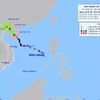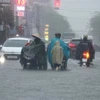Around 150,000 Vietnamese lives may be at risk and another 5 million may contract harmful diseases due to global warming, according to research from the World Health Organisation (WHO).
The information was released in a workshop themed "Mainstreaming an ecosystem-based approach (EAB) to climate change into biodiversity conservation planning in Vietnam" held on October 15. It was jointly organised by the Ministry of Natural Resources and Environment, the Asian Development Bank (ADB), and the World Wildlife Fund (WWF).
According to the WHO's research, the number of affected people may double by 2030, posing serious threats to the country's economic development and human life.
ADB director Tomoyki Kimura said climate cha nge posed serious threats to Vietnam, adding that around 8.5 million people would be displaced and 30 percent of traffic infrastructure destroyed if water levels rose one metre higher than current levels.
"At the same time, at least 25 per cent of agricultural land would become salt-marsh," he added.
According to Raji Dhital from the WWF, climate change also poses a devastating threat to biodiversity. In the Greater Mekong Sub-region alone, between 133 and 2,835 species of flora and 10 to 213 species of spinal fauna were said to be in danger of extinction.
Dhital also emphasised the need to recover mangrove forests and develop sustainable forestry to adapt to the effects of climate change.
An ecosystem-based approach is a strategy for integrating the management of land, water and living resources. EBA promotes the equitable conservation and sustainable use of resources and helps people and biodiversity adapt to the adverse impacts of environmental change, including climate change.
The mainstreaming of EBA into policy provides a cost-effective way to improve the management of natural resources. Apart from generating social, economic and cultural benefits, the strategy may also help to boost ecosystem resilience.
According to experts, Vietnam has achieved positive results from the use of EBAs in small and medium projects but has little experience mainstreaming EBAs into development planning.-VNA
The information was released in a workshop themed "Mainstreaming an ecosystem-based approach (EAB) to climate change into biodiversity conservation planning in Vietnam" held on October 15. It was jointly organised by the Ministry of Natural Resources and Environment, the Asian Development Bank (ADB), and the World Wildlife Fund (WWF).
According to the WHO's research, the number of affected people may double by 2030, posing serious threats to the country's economic development and human life.
ADB director Tomoyki Kimura said climate cha nge posed serious threats to Vietnam, adding that around 8.5 million people would be displaced and 30 percent of traffic infrastructure destroyed if water levels rose one metre higher than current levels.
"At the same time, at least 25 per cent of agricultural land would become salt-marsh," he added.
According to Raji Dhital from the WWF, climate change also poses a devastating threat to biodiversity. In the Greater Mekong Sub-region alone, between 133 and 2,835 species of flora and 10 to 213 species of spinal fauna were said to be in danger of extinction.
Dhital also emphasised the need to recover mangrove forests and develop sustainable forestry to adapt to the effects of climate change.
An ecosystem-based approach is a strategy for integrating the management of land, water and living resources. EBA promotes the equitable conservation and sustainable use of resources and helps people and biodiversity adapt to the adverse impacts of environmental change, including climate change.
The mainstreaming of EBA into policy provides a cost-effective way to improve the management of natural resources. Apart from generating social, economic and cultural benefits, the strategy may also help to boost ecosystem resilience.
According to experts, Vietnam has achieved positive results from the use of EBAs in small and medium projects but has little experience mainstreaming EBAs into development planning.-VNA



















